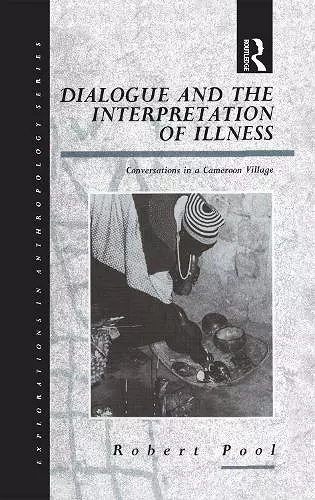Dialogue and the Interpretation of Illness
Conversations in a Cameroon Village
Format:Paperback
Publisher:Taylor & Francis Ltd
Published:11th May '94
Currently unavailable, and unfortunately no date known when it will be back
This paperback is available in another edition too:
- Hardback£145.00(9780854968732)

Also available in hardback, 9780854968732 GBP50.00 (May, 1994)
The etiology of the Wimbum people in the Western Grassfields of Cameroon is described through an examination of the way in which the meanings of key concepts, used to interpret and explain illness and other forms of misfortune, are continually being produced and reproduced in the praxis of everyday communication.The etiology of the Wimbum people in the Western Grassfields of Cameroon is described through an examination of the way in which the meanings of key concepts, used to interpret and explain illness and other forms of misfortune, are continually being produced and reproduced in the praxis of everyday communication. During the course of numerous dialogues, witchcraft, a highly ambivalent force, gradually emerges as the prime mover. As destructive cannibals or respectable elders the witches are the ultimate cause of all significant illness, misfortune and death, and as diviners they are also the ultimate judges who apportion moral responsibility. Even the ancestors and the traditional gods turn out to be fronts behind which the witches hide their activities.The study is on three levels: a medical anthropological exploration of explanations of illness and misfortune; a detailed ethnography of traditional African cosmology and witchcraft; and an examination of recent theoretical issues in anthropology such as the nature of ethnographic fieldwork and the possibility of dialogical or postmodern ethnography.
'Robert Pool's completely honest revelation of his interviews and his attempts to make sense of them are a welcome and encouraging illustration of how fieldwork is usually conducted, what kind of data we are collecting, and how meaning is produced from it. It is not just a theoretical contribution, but also an excellent book to read before or after going into the field.'Folk: Journal of the Danish Ethnographic Sociey' Written in accessible and highly readable English, this substantial book should become a popular text in courses in anthropology, comparative religion and medical systems, and cross-cultural studies. Pool demonstrates in ways that immediately engage the reader how understanding and knowledge are never 'finally' determined once and for all, but are continually being defined and redefined by informants and ethnographers, in dialogical process. [...]This book contributes importantly to the development of conceptual frameworks for investigating and anaysing topics th
ISBN: 9781859730164
Dimensions: unknown
Weight: 453g
298 pages